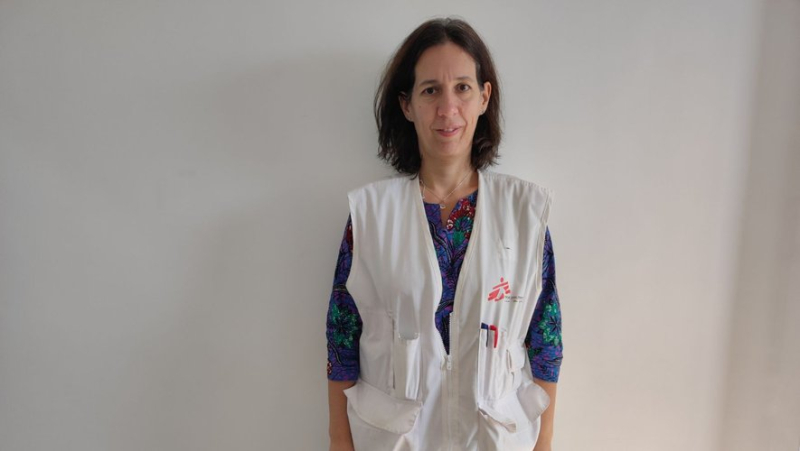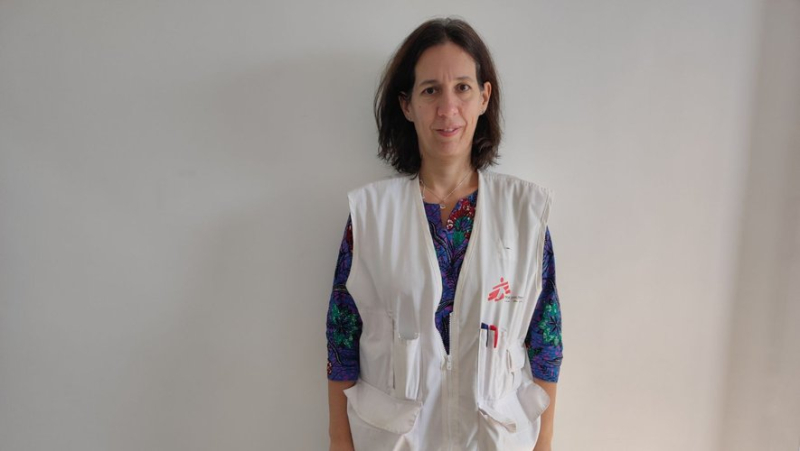“In the Gaza Strip, it’s not a war, it’s a slaughter”: the edifying testimony of a Doctors Without Borders official

Aurélie Godard, responsable des activités médicales de Médecins sans frontières dans la bande de Gaza. DR
Aurélie Godard, 43, a resuscitator anesthetist, has experienced different theaters of war with Médecins sans frontières (MSF), from Yemen to Iraq, unlike what is happening in the Gaza Strip, she explains. -She. She gives us her testimony.
You are leaving again on Monday for the Gaza Strip, to direct the medical activities of Doctors Without Borders as you did until February 8 last. What did you observe on site?
In Rafah, in a hospital structure with around sixty beds, we treated almost exclusively victims of bombings, with destructive injuries, from babies to the elderly, often people & nbsp;who had lost part of the family.
Generally, patients are happy when we tell them that they can leave the hospital, here, almost all of them require a little time. nbsp;to find a tent, build a shelter, because they lost everything.

They most often arrive on carts pulled by donkeys, with the meager possessions they were able to carry, the bare minimum to escape the fighting and take refuge further south in Rafah: a can of water, some mattresses and kitchen utensils. 60 to 70% of homes are destroyed or damaged. They are leaving a place they will never see again.
There are many displaced people, more than a million in Rafah, with children everywhere in the streets, lost in this human misery.
They still manage to be amazed by their kites made of odds and ends, which fly over the refugee camps while they wade through the disgusting waters.
As soon as we take our eyes off the kites, we see these clustered tents, in which people are grouped together in groups of ten, fifteen, twenty, set up on the sidewalk, on the roundabouts. ;Every nook and cranny is occupied by a makeshift shelter. Waste litters the streets. It’s a kaleidoscope of images, each more poignant than the last.
These civilians are living in fear right now.
They have been terrified since rumors of an invasion of Rafah began to circulate, because they know the atrocities committed with the advance of the front, they wonder where they will be able to go.
The answer is nowhere. On one side there is the sea, on the other the border with Egypt. They can no longer move forward. They are cornered, pushed by the tanks, and see death coming their way.
Can we also talk about a famine situation?
Yes, in the north of the Gaza Strip, an image struck me: just after the Israeli army checkpoint, a little before Upon arrival in Gaza City, a horde of around twenty young men jumped on the car and their only question was: where is the food? We ;nbsp;transportation of fuel oil for the Al-Shifa hospital which, at the time, was trying to resume activity, and that was all we had. It was January 22, in the North, they were already starving. Since then, the situation has only gotten worse.
We are heading towards the same difficulties in the South, where the bulk of the population is now located, everyone does not have enough to eat every day.
So you know the Al-Shifa hospital, the largest in the Gaza Strip, which has just been destroyed. Israel explains that there were fighters in the establishment, this seems plausible to you?
In all the hospitals in the Gaza Strip that I went to (the European Hospital, the Nasser Hospital, the Al-Shifa Hospital, the ;rsquo;Al Najjar hospital, etc,) I only saw civilians. I can't say whether or not there are fighters, in any case I've never seen any.
The destruction of Al-Shifa will also have serious humanitarian consequences.
It’s dramatic, the Israeli army is destroying all the infrastructure, hospitals, schools, factories quite meticulously and thus making this territory unlivable.
We now fear that the Nasser hospital will suffer the same fate as that of Al-Shifa. The Israeli army claims, here too, that there would be place of the fighters. At each stage of the war, we go down a step in the ladder of horror.
Seven members of World Central Kitchen were killed by an Israeli strike on Monday. NGOs suspend their activities in the Gaza Strip. This worries you ?
Yes, from the beginning. It’s very difficult to intervene, no place is safe. This limits humanitarian action. This tragedy clearly shows that even when taking precautions, there is no respect for humanitarian workers and the aid provided to the population. It's World Central Kitchen, but it could have been us, or the Red Cross.
This is not the first time that humanitarian aid has been the target of Israeli attacks. There are already no foreign journalists, so if there are no more humanitarians there will be no more perspective on the unfolding tragedy , this will make the fate of the Palestinian population even more invisible.
How do you go about trying to protect yourself?
As World Central Kitchen does, we coordinate with the Israeli army: we tell them where we want to go when it's a very exposed area, we wait until ;rsquo;they say yes or no. Sometimes they tell us "yes but by this route".
The places where we work, where we live, are also notified to the Israeli army with GPS coordinates. We try to make travel as secure as possible, to reassure ourselves a little, but this is in no way a 100% guarantee.
Despite this risk, you will return on Monday.
I'm going back because what's happening in Gaza is inhumane, it's not a war, it's butchery. These are people huddled together under tents and bombs are being dropped on them. That’s what we’re talking about.
This is not my first war zone at MSF, but it is the worst of all, particularly due to the density of bombings, on such a small piece of land. land, with so many people per square kilometer, hence the number of dead and injured. The world needs to open its eyes to what is happening there.
I subscribe to read more




